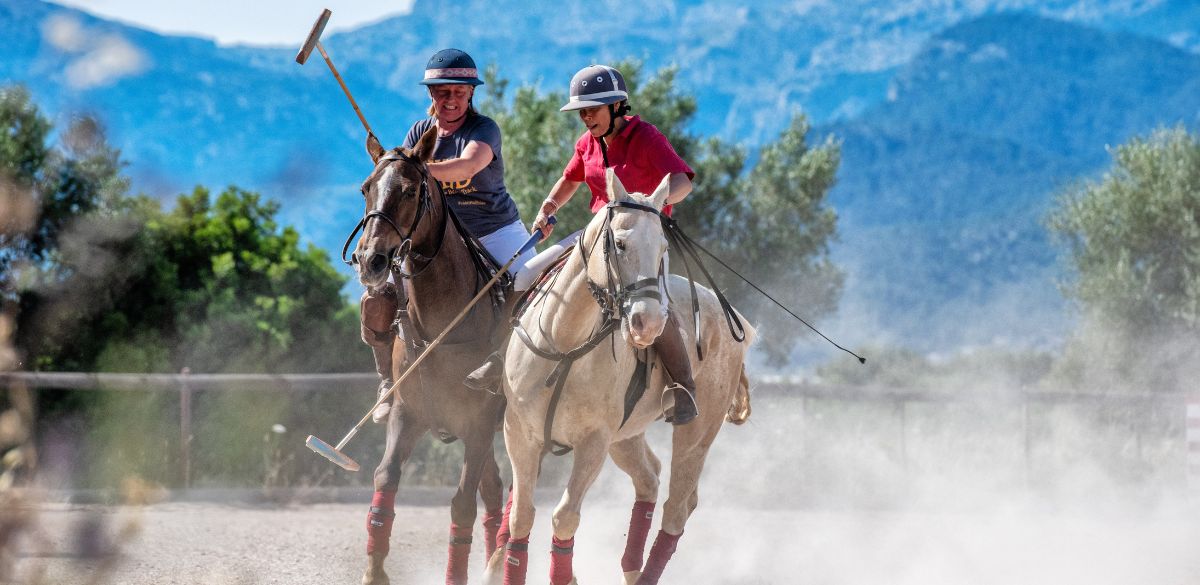When people think of Mallorca, images of sun-soaked beaches, Gothic cathedrals, sleek yachts, or youthful escapades in Magaluf often come to mind. Yet beyond the island’s bustling tourist hubs, a quieter transformation is taking place: polo is taking root in Mallorca—not as an exclusive pastime, but as a growing, community-driven lifestyle.
Traditionally associated with private clubs, lavish tournaments, and the international jet set, polo in Mallorca is now being reimagined. A new wave of initiatives is making the sport accessible, blending equestrian culture with nature, and a strong sense of place. Rather than a polished, elite image, Mallorca’s polo scene emphasizes inclusivity, education, and connection to the land.
Can Cavall Blau: Sand Polo and community
At Can Cavall Blau, an organic farm and vineyard in the island’s rural interior, polo is taught on homebred horses. Owners Dirk and Katja Lebelt have built the academy around a simple philosophy: polo is for everyone. Lessons focus on horsemanship, confidence, and community as much as competition, welcoming all those interested in the sport regardless of prior experience.
Dirk, a respected equine veterinarian, and Katja, a former set designer from Berlin, moved to Mallorca eight years ago with their horses, including a golden palomino stallion named Fleki. Their estate has since become a hub for both polo enthusiasts and curious newcomers. On Wednesdays, Can Cavall Blau opens its gates for farm tours and tastings of its organic produce. Sundays have become a local highlight: casual exhibitions, meals by local chefs, sundowners, and spectacular sunsets over the mountains, with horses grazing nearby and an Amarguero spritz in hand.
A standout feature of Can Cavall Blau is its sand polo field, which allows year-round play while conserving water and minimizing environmental impact. This approach ensures that polo is not only inclusive but also sustainable, reflecting a conscious, modern approach to equestrian sport.
Another cornerstone of Mallorca’s polo scene is Son Ginard, an agrotourism estate nestled in the tranquil countryside of Campos. Covering 250,000 square metres, the estate blends traditional Mallorcan architecture with contemporary structures, including contributions by renowned architect Richard Meier. The combination of restored historic buildings and modern design creates a harmonious environment, perfectly suited to equestrian pursuits.
The Mallorca Polo School has also just opened its doors at Barralina Polo Club near Es Trenc, offering lessons in another beautiful location.
Polo as a lifestyle
What makes polo’s growth in Mallorca so compelling isn’t just the sport itself, but the lifestyle it cultivates. Events at Can Cavall Blau are intimate and unpretentious, often paired with wine tastings, slow meals with local chefs and, a deep-rooted connection to the land. It’s less about trophies and more about rhythm: the rhythm of horses, nature, and community.
Mallorca’s long equestrian tradition provides a natural foundation. From countryside riding schools to annual festivals like Sant Antoni, horses have been central to island life for generations. Polo feels like a natural evolution—an elegant addition to the island’s enduring equestrian culture.
Importantly, this new wave of polo prioritizes responsible horsemanship. Can Cavall Blau breeds and raises its ponies on site, emphasizing ethical treatment and sustainable practices. Other schools and estates adopt similar approaches, from sand fields to pasture management, ensuring polo grows in harmony with the environment.
How to get involved
For those interested in experiencing Mallorca polo firsthand, there are multiple avenues to get started: lessons at Can Cavall Blau, or at the Mallorca Polo School, Son Ginard in Campos, or at Vernisetta near Sa Ràpita. Each offers a slightly different experience, yet all share a commitment to community, accessibility, and immersion in the equestrian lifestyle. Octavia Campbell-Davys, a UK-certified umpire, and Leo Rossolini, a professional player from Argentina, recently hosted their first Polo Clinic at Can Cavall Blau for experienced riders new to the sport. The all-day event welcomed up to six newcomers and concluded with a relaxed evening BBQ. Participants explored horsemanship, tactics, the rules of the game, and riding techniques, finishing the day with a full chukka. Can Cavall Blau currently offers nine school horses, catering to a range of riding abilities and sizes, ensuring a comfortable and safe introduction to polo.
Leo will soon return to Argentina, where he runs polo holidays, while Octavia will remain in Mallorca, teaching throughout the winter. “One of the joys of playing polo here,” she notes, “is the ability to enjoy the sport all year round.” She hopes the academy will not only attract polo tourists but also serve as a training destination for the Schools and University Polo Association (SUPA) in the UK, fostering a new generation of players in a stunning Mediterranean setting.
With its grassroots approach, sustainable practices, and scenic settings, Mallorca is quietly establishing itself as a European hub for accessible, lifestyle-driven polo. For those seeking a deeper connection to the island, its landscapes, and its horses, polo offers a compelling and enriching way to experience Mallorca beyond beaches and resorts.
https://www.instagram.com/engelvoelkers.equestriancentre
























0 Comments